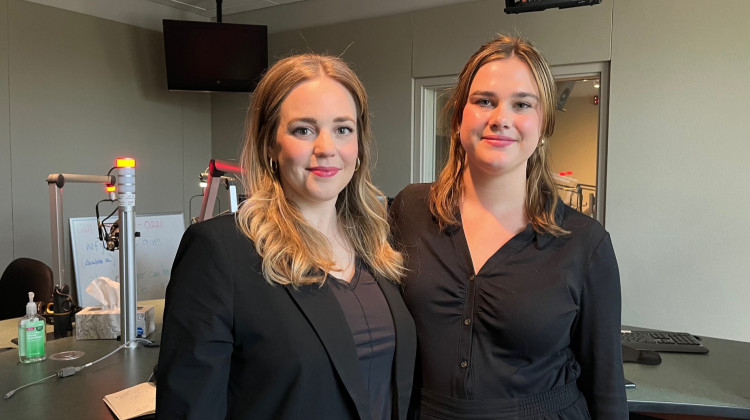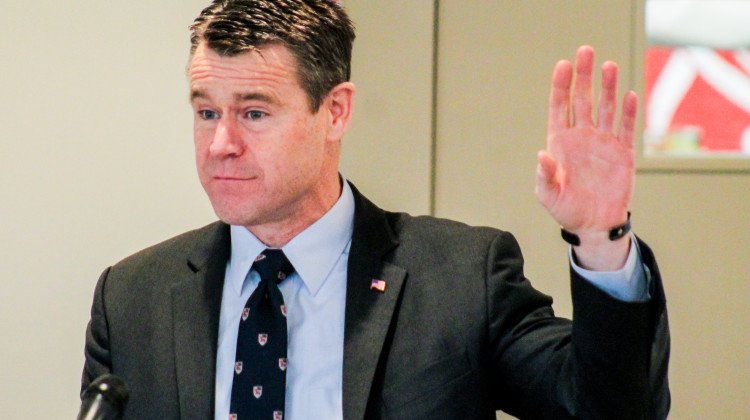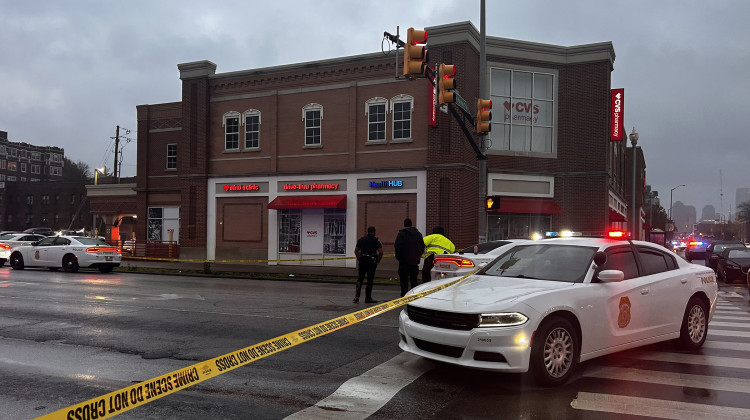Stories of sexual harassment and misconduct by Indianapolis Mayor Joe Hogett’s former chief of staff have come to light in recent weeks.
Two local news investigations, one from IndyStar and another from Mirror Indy, focused on the experiences of three women who say Thomas Cook sexually harassed and groomed them and was allowed to continue the troubling behavior for years.
Hogsett publicly apologized at a City-County Council meeting this week and said he supports policy ideas outlined in a letter from two of the three women — former employees Lauren Roberts and Caroline Ellert.
WFYI’s Jill Sheridan sat down with Roberts and Ellert to talk about their experiences with Cook.
This interview has been edited for length and clarity.
Jill Sheridan: Can you talk a little bit about the decision to step forward and put your story on record?
Caroline Ellert: When the Indianapolis Star article came out, I was able to kind of get a sense of how people were going to react. And a lot of former colleagues, friends reached out to me and knew it was me anyway, and I think it's important to show other victims that they don't have to be ashamed. And also, Lauren, doing it so bravely as well, was a good example, and I felt really strong, us doing it together.
Sheridan: And since you both put out a letter. In that letter, you say, you know, part of your goal is to disrupt the culture of victim blaming. Lauren, what does that mean to you?
Lauren Roberts: As someone who has been on the receiving end of that culture? I know how painful it is, and I believe I said this to the Star too, but almost more traumatic than the original abuse was not being believed and spending seven years wondering if anything would ever happen. Not necessarily because I desired to punish anybody, although I believe in accountability, but because I was struggling with the idea that this was still happening to other people, and as I suspected, it was.
I also think it's important to shift culture in addition to policy, because policy and procedure on paper is one thing. It matters. I don't want to take away from that. But if there's still a culture that enables this behavior, that protects this behavior and perpetuates it, the policy doesn't matter. Because, as we've seen with the city releasing its updated policies and making these statements, things were still really bad, and we believe still are really bad.
Sheridan: How pervasive is this? What does this tell us about the administration, how it operates, and you know, how many people knew this behavior was happening?
Roberts: I would suspect quite a few people. I personally, in addition to emailing the mayor, texted, called, Facebook messaged, forwarded emails to several other people around him who I knew from my time on the campaign, people I didn't necessarily have strong personal relationships with. I can count on one hand the number of replies I got, but on two fingers, the number of people who sat down and listened to me and believed me from the beginning.
Sheridan: Caroline, would you like to add?
Ellert: Yeah, I remember whenever Lauren was sounding the alarm, because I was at the city, and I was just beginning to experience this with Thomas, and she wasn't believed, and people thought she was irrational.
They thought she was crazy. It really made me believe that narrative as well. I think it's also something women in any workplace are used to. There's a certain amount that you have to put up with, and if you don't put up with it, you aren't a team player, or you're just not going to succeed.
Sheridan: You know, the reporting system obviously failed across many levels. What would have helped you?
Roberts: Well, for me as a campaign employee, any reporting system would have been helpful. I also think that interventions from people with more experience and who were maybe older and had more influence than I did as a 26 year old, working in Indiana politics for the first time, I had worked on Capitol Hill in D.C., but I was very green to Indianapolis.
So I wish that other people had intervened on my behalf when they noticed things, like him saying disrespectful stuff to me in meetings in front of other people. Obviously they weren't able to see the extent of the abuse that happened privately and in texts and calls, but they could have said something in those other moments.
Sheridan: In your letter you've outlined some policy recommendations that you think would be helpful in the administration moving forward for women in this type of situation. What's at the top in your mind Lauren?
Roberts: I think that investigation is top of mind for me. Before policy can come forward, there needs to be an understanding of the extent of the problem. And also, I personally would like to see documentation of the supposed investigation the city says it did into my report in 2017. I was never interviewed. To this day, I haven't seen any evidence of that.
Sheridan: How about yourself, Caroline?
Ellert: It's important that victims know their rights, so the education piece of it is really important to me. I didn't recognize what was happening to me as harassment. I didn't recognize it as abuse when it was happening.
So I think it's really important that people know their rights, and they know that. People know they feel uncomfortable, they know something's wrong, but it's hard to put it into words, and I hope that by having these conversations, we can help people put it into words.
Sheridan: Well, I thank you both so much for coming in today and sharing your story.
Roberts and Ellert: Thank you. Thank you, Jill.
 DONATE
DONATE







 Support WFYI. We can't do it without you.
Support WFYI. We can't do it without you.